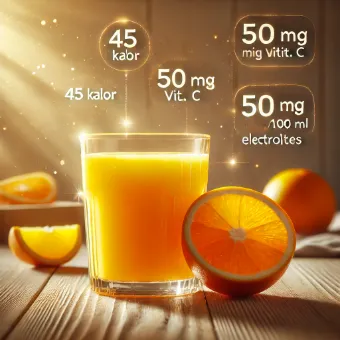Orange Juice: 45 kcal, 50 mg Vitamin C & Natural Electrolytes per 100 ml
Fresh-squeezed sunshine that hydrates, delivers flavonoid antioxidants and brightens breakfast—just watch the sugar load.

What Is Orange Juice?
Liquid pressed from ripe **_Citrus × sinensis_** oranges; sold fresh, pasteurised, from concentrate or with added pulp.
Nutrition (100 ml, not-from-concentrate)
|Calories|Sugars|Protein|Fat|Potassium|Vit C|
|---|---|---|---|---|---|
|45 kcal|10 g|0.7 g|0 g|180 mg|50 mg (55 %)|
Benefits
- **Vitamin C** supports immunity & collagen.
- **Hesperidin & naringenin** flavonoids show anti-inflammatory, vessel-protective activity.
- 88 % water plus potassium help post-workout rehydration.
Drawbacks
- 10 g fast-acting sugar/100 ml → spike in blood glucose; keep to 150 ml serving.
- Stripped of most fiber (< 0.2 g) compared with whole fruit.
- Acidic pH ≈ 3.8 may erode enamel—drink with meals or a straw.
Flavour & Mouthfeel
Bright **sweet-tart citrus**, aroma released on the nose; pulp adds pleasant body, concentrate tastes slightly cooked.
Culinary Uses & Storage
- Breakfast staple, **smoothies, mocktails, sangria, ceviche cure**.
- Reduce with zest for orange glaze, sorbet base, panna-cotta syrup.
- Refrigerate ≤ 4 °C; fresh-pressed 3 d, pasteurised 7 d once opened; freeze up to 6 m.
- 1. Orange Juice

